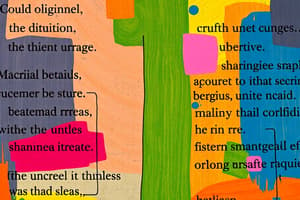Podcast
Questions and Answers
Which type of conditional sentence is based on facts or scientific principles?
Which type of conditional sentence is based on facts or scientific principles?
- Third conditional
- First conditional
- Second conditional
- Zero conditional (correct)
In a first conditional sentence, what is the structure used to connect the condition and the result?
In a first conditional sentence, what is the structure used to connect the condition and the result?
- If + present tense (correct)
- If + present perfect
- If + past simple
- If + future continuous
Which type of conditional sentence is used to express likely future outcomes based on present reality?
Which type of conditional sentence is used to express likely future outcomes based on present reality?
- Mixed conditional
- First conditional (correct)
- Zero conditional
- Second conditional
Which type of conditional sentence is a combination of aspects from the second and third conditionals?
Which type of conditional sentence is a combination of aspects from the second and third conditionals?
What type of conditional sentence expresses situations where one thing always causes another?
What type of conditional sentence expresses situations where one thing always causes another?
Which type of conditional sentence is used to express unreal or hypothetical situations unlikely to happen in the future?
Which type of conditional sentence is used to express unreal or hypothetical situations unlikely to happen in the future?
In a second conditional sentence, what is the structure used for the condition and result?
In a second conditional sentence, what is the structure used for the condition and result?
Which form of mixed conditional presents an unreal condition in the past that affects an unreal outcome in the present?
Which form of mixed conditional presents an unreal condition in the past that affects an unreal outcome in the present?
When is the first conditional typically used?
When is the first conditional typically used?
Which type of conditional sentence is best suited for expressing an improbable event and its outcome in the future?
Which type of conditional sentence is best suited for expressing an improbable event and its outcome in the future?
Flashcards
Zero Conditional
Zero Conditional
Expresses general truths or scientific facts where one thing always causes another.
Zero Conditional Structure
Zero Conditional Structure
If + present simple (condition) ... present simple (result).
First Conditional
First Conditional
Expresses likely future situations based on present reality.
First Conditional Structure
First Conditional Structure
Signup and view all the flashcards
Second Conditional
Second Conditional
Signup and view all the flashcards
Second Conditional Structure
Second Conditional Structure
Signup and view all the flashcards
Mixed Conditional
Mixed Conditional
Signup and view all the flashcards
Mixed Conditional Form 1
Mixed Conditional Form 1
Signup and view all the flashcards
Mixed Conditional Form 2
Mixed Conditional Form 2
Signup and view all the flashcards
Conditional Use
Conditional Use
Signup and view all the flashcards
Study Notes
Conditionals in English: Zero, First, Second, and Mixed Conditionals
Conditionals are used in English to express different degrees of probability that a situation will occur or would have occurred under certain conditions. There are four main types of conditional sentences: zero, first, second, and third. In this article, we will focus on zero, first, and second conditionals, as well as mixed conditionals that combine aspects of the second and third conditionals.
Zero Conditional
Zero conditionals express general truths, situations in which one thing always causes another. They are based on facts or scientific principles that are invariable. The structure of a zero conditional sentence is:
- If + present simple (condition) ... present simple (result)
Example:
- If you touch a fire, you'll get burnt.
- If it rains, plants will grow.
Zero conditionals are statements of fact and are always true.
First Conditional
First conditionals are used to express situations in which the outcome is likely to happen in the future. They are based on present reality and the likelihood of a future event. The structure of a first conditional sentence is:
- If + present tense (condition) ... will/won't + infinitive (result)
Example:
- If you study hard, you will pass the exam.
- If you save money, you will be able to buy a house.
First conditionals are used when the outcome is considered probable, but not certain.
Second Conditional
Second conditionals are used to express unreal or hypothetical situations that are unlikely to happen in the future. They are based on past reality and the improbability of a future event. The structure of a second conditional sentence is:
- If + simple past (condition) ... could/would + infinitive (result)
Example:
- If I had a million dollars, I would buy a yacht.
- If I knew her phone number, I would call her.
Second conditionals are used when the outcome is considered highly unlikely or impossible to happen.
Mixed Conditionals
Mixed conditionals combine aspects of the second and third conditionals to present both an unreal condition (either in the past or the present) and an unreal result (either in the past or the present). There are two forms of mixed conditionals:
- If + past perfect, modal + base (result) - This form presents an unreal condition in the past that changes an unreal outcome in the present.
Example:
- If I had finished college, I would be a doctor now.
- If it had rained last week, the plants would be alive now.
- If + simple past, would/could + present perfect (result) - This form presents an unreal condition in the present that changes an unreal outcome in the past.
Example:
- If I spoke louder, you would have heard me before.
- If you were nicer, you could have had more friends when you were younger.
Mixed conditionals are used to express a hypothetical situation and its unreal outcome, either in the past or the present.
In conclusion, conditionals in English are an essential tool for expressing various degrees of probability and hypothetical situations. By understanding and using zero, first, second, and mixed conditionals correctly, you can effectively communicate complex ideas and scenarios.
Studying That Suits You
Use AI to generate personalized quizzes and flashcards to suit your learning preferences.




